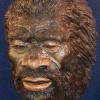Well, kind of. We're not talking about mathematics, we're talking about living organisms, and statistics don't really need to have much bearing on whether an animal lives or not. Keeping with the previous dinosaur analogy, they lived for 100 million years and were pretty successful. A meteor came and ruined that; it happens. A person could consitantly live for 100 years in good health and suddenly get hit buy a bus. Just because something has lived, doesn't mean it's always going to.
H. Habilis was around five feet tall and is noted for making tools. As far as I know nothing is running around the African savannah doing that, nor are people seeing that. Their fossil record also stops at about 1.4 million years ago (not 10,000 years ago), so it's pretty safe to assume that they died out. You keep saying that other bipedal primates existed until 10,000 years ago, but you have to remember that there were lots of them running around, we're deeling with a lot of time; many of these species are separated by thousands or millions of years. The only hominin that has a fossil record going to 10,000 years ago is H. floresiensis, and they lived on fairly remote islands in Indonesia and may have had no contact at all with H. sapiens. Most other hominins died out before that, for example the most recent Neanderthal remains found date to about 24,500 years ago.
Not at all. Neadnerthals are a great example of this. Their remains are found all over Europe and stretch back hundreds of thousands of years, but suddenly end at 24,500 years old. The remains that date back that far were found on the Iberian peninsula (a place humans weren't inhabiting at the time) and suggest that Neanderthals had lost territory (the fossil record shows their territory descreasing steadily before that) and had retreated to the most isolated place they could. Considering that no remains have been found more recent than that, and Neanderthals seem to have been diminishing at the time, it's pretty reasonable to assume that they died out. Also keep in mind that conclusions like that (as with everything else in science) is based on the evidence available. If something were found that would prove it wrong, different conclusions would be drawn.
The DNA evidence of human/Neanderthals interbreeding actually suggests that it wasn't recurring. The shared DNA is found in pretty much the same amounts across all Eurasian peoples, which suggests that the interbreeding took place shortly after we left Africa and didn't continue. Otherwise, some populations would have more Neanderthal DNA than others (continued breeding = more DNA). As far as human hunting Neanderthals out, no one I'm aware of in anthropology thinks that happened; the current hypothesis (and what the evidence suggests) is that we outcompeted them for resrouces because of superior technology.
I'm glad to help if I can and people are actually willing to listen to what I have to say. I would say that there isn't a rule. Nothing is set in stone that says "more than one species of bipedal primate needs to exist at all times." The reason why we stayed alive when others didn't is that we're very smart, we make good tools, and we made it to the top of the food chain. It's hard (maybe even impossible) for anything else to compete with us, and that applies to our relatives as well, especially if they were to occupy the same niche as us.



